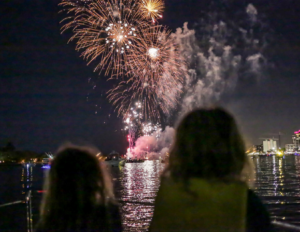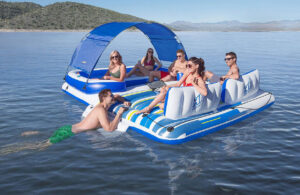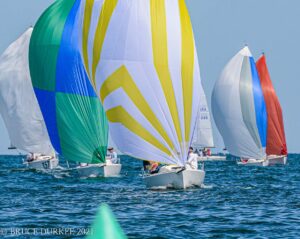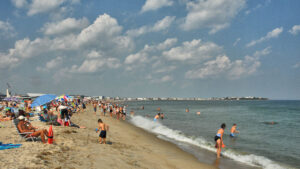We’ve put together a list of 10 spots worth a look whether you simply want a change of venue or are looking to cross a species off your “bucket list.” Keep in mind some of these same locales have dedicated seasons, size and bag limits for the species noted and some also require a fishing license. The best point of reference no matter where you travel is a local tackle shop which can provide guidance on tackle and bait selections as well as other tips and tricks and perhaps even insight to their favorite honey hole.
NANTUCKET, MASSACHUSETTS
The waters around Nantucket boast a variety of game fish whether fishing from the beach, pier, jetty or boat. The best action takes place beginning in April as schools of hungry striped bass arrive with a vengeance. It continues through mid-July then again from September through mid-October. A variety of techniques work including plugs, live bait and trolling. Early May sees the arrival of massive schools of bluefish and surface plugs provide excitement as choppers crash lures often within close range of the angler! Offshore trips can range outward to 100 miles for action with bluefin, yellowfin and big eye tuna, blue marlin and white marlin, swordfish, mahi mahi as well as mako and blue sharks especially during the months of June through September. Sight casting along the sandbars for large stripers, bonito and false albacore is also popular.
Where to Dock: Nantucket Boat Basin (508-325-1350, nantucketboatbasin.com)
MONTAUK, NEW YORK
Montauk sits at the far end of Long Island some 100 miles into the Atlantic Ocean. From the waters of Long Island Sound to its famed surf to the offshore waters there’s a species to be caught from spring through late fall. May finds striped bass and bluefish arriving in a hungry mood and near shore anglers find sea bass and fluke which are present through October (with specific regulated seasons). Offshore action kicks into gear in June with mako sharks the prime target followed by bluefin, yellowfin and big eye tuna, which are available June through mid-October. White and blue marlin, dolphin and wahoo are also available during the same timeframe. For surfcasters, schools of striped bass and bluefish crashing through schools of bait as birds overhead pick an easy meal from the remains is the ultimate venue. Casting plugs into this frenzy with the Montauk Lighthouse as the backdrop is their paradise during the months of late September through November.
Where to Dock: Montauk Yacht Club Resort & Marina (631-668-7702, montaukyachtclub.com
CAPE MAY, NEW JERSEY
This tiny Victorian town is the nation’s oldest seaside resort and lies at the southernmost point of the Garden State and is popular year-round. For anglers looking to tangle with feisty white marlin, it is hard to beat the canyons off the South Jersey coast from August through mid-October. This is prime season to tangle with these popular billfish, which range in size from 40 to 70 pounds. This is light tackle fishing at its finest and 20 or 30-pound outfits are all you need. Catch-and-release fishing and a growth in the use of circle hooks with ballyhoo have helped white marlin stocks rebound and good days see a dozen or more of tailwalking white marlin released. Look for an occasional blue marlin to make your trip interesting and sailfish bites make a grand slam rare but possible. Dolphin, yellowfin and big eye tuna are also found during the same time of year.
Where to Dock: Canyon Club Resort Marina (609-884-0199, canyonclubmarina.com), South Jersey Marina (609-884-2400, southjerseymarina.com)
PALM BEACH, FLORIDA
Florida’s famed Gold Coast is a playground for the rich and famous from its elegantly groomed and ultra-exclusive golf and polo clubs to the glitz and glamour of Worth Ave. Here the Gulf Stream brushes the shoreline often within two miles of the coast and the best fishing occurs during the winter months as pods of sailfish invade the area from November through February. Leave your shorts at home if you want to score with spindlebeaks as seasonal cold fronts from the north kick up the sea and get the sails in a feeding mood. Live bait from kites will draw the most strikes though many prefer the traditional approach of trolling ballyhoo. In between sailfish bites look for dolphin, wahoo, kingfish and blackfin tuna to fill out the day. When the bite is on double-digit releases of sails are possible.
Where to Dock: Old Port Cove Marina (561-626-1760, opch.com)
THE FLORIDA KEYS
The Florida Keys stretch from Key Largo to Key West along nearly 120 miles of US Highway 1, also known as the Overseas Highway. From the backcountry of Florida Bay to the flats which brush the coastline on both sides of the chain of islands to the crystal blue offshore waters there’s a species to be caught year ‘round. Winter months find sailfish snapping from the edge of the reef to offshore during cold fronts. Dolphin, wahoo, kingfish, blackfin tuna, bonito and Spanish mackerel are also available. The Keys are also a prime spot to add the elusive swordfish to your résumé. Bonefish, tarpon and permit patrol the flats as spring arrives while Florida Bay and Flamingo offer a shot at a backcountry slam with redfish, snook and trout. Look for wrecks and reefs to yield an abundance of tasty snapper and grouper. Other less desirable species which put up a good fight include jacks, barracuda and numerous species of sharks.
Where to Dock: Plantation Yacht Harbor Marina (305-852-2381, pyh.com), Postcard Inn Beach Resort & Marina (305-664-2321, holidayisle.com)
ORANGE BEACH, ALABAMA
Orange Beach and nearby Gulf Shores, Alabama combined are home to one of the largest charter boat fleets on the Gulf Coast. These experienced captains and crews, together with the area’s popular shore and pier fishing combine to offer an extensive menu of fishing opportunities. Gulf State Pier, the second largest pier in the Gulf, measures 1540 feet and is an excellent spot for land-based anglers to catch pompano, redfish, bluefish, jacks, ladyfish and flounder. Casting lures and baits from the beaches of the back bays, lagoons and gulf shore yields most of the same species as you wade the warm waters of summer. Near-shore Little Lagoon, Mobile Bay, Wolf Bay and Perdido Bay are where you’ll find specked trout, redfish, sheepshead, black drum Spanish and king mackerel. On the offshore grounds look for blue and white marlin, king mackerel, yellowfin tuna, swordfish, and wahoo when trolling, while bottom dwellers such as a variety of snappers will keep rods bent on your trip.
Where to Dock: Orange Beach Marina (251-981-4207, orangebeachmarina.com), Saunders Yachtworks Orange Beach (251-981-3700, saundersyacht.com)
THE BAHAMAS
The Bahamas has a huge variety of species. From its sandy flats to cobalt-blue offshore waters, this popular island cluster has something for every angler. The flats of nearly every island offer excellent opportunities to cast flies or shrimp at tailing bonefish and permit year ‘round — the best action is during the spring and summer months when winds are light and fish are easy to spot. Bottom fishing for grouper and snapper species can be accomplished all year around wrecks and reefs near shore. Offshore look for the best shots at big blue marlin to occur from late March through June in the Abaco and Eleuthera islands. White marlin and sailfish are also abundant along with big mahi-mahi. San Salvador, Rum Cay and Long Island each offer great wahoo fishing during the late fall and early winter months.
Where to Dock: Abaco Beach Resort & Boat Harbour Marina (242-367-2158,
abacobeachresort.com), Treasure Cay Beach Marina (242-365-8250, treasurecay.com), Hope Town Inn (242-366-0003, hopetownmarina.com)
ST. THOMAS, US VIRGIN ISLANDS
Popular with cruise ship vacationers and honeymooners alike, St. Thomas is well known for its beautiful beaches, luxurious all-inclusive resorts and popular shopping district. If blue marlin are on your bucket list, than this island is the place to be in late summer through early fall. The backside of the full moon is when the bite for “blue ones” typically goes off on the North Drop and while the fish are rarely huge, most are in the 150- to 400-pound class. Trade winds can make conditions a bit sporty at times so those with a tendency to come down with a case of mal de mare should prepare accordingly. White marlin, sailfish, wahoo and big yellowfin tuna are also possibilities, though most of the billfish pros will shy away from tactics for those species because the blue marlin bite is that good.
Where to Dock: IGY’s American Yacht Harbor (340-775-6454, igy-americanyachtharbor.com)
DOMINICAN REPUBLIC
The Dominican Republic offers excellent winter and early spring billfish action with most action taking place two to 50 miles offshore. Blue marlin and white marlin are the predominant billfish species, though an occasional spearfish will also be caught. Sailfish are scarce, though yellowfin tuna, wahoo and mahi-mahi are a regular by-catch by billfish anglers. The south side of the island off La Romana tends to have a pretty good bite of blue marlin though whites are not as prevalent. From December through February blue marlin become prevalent on the FAD’s (Fish Attracting Devices) though seas get sporty due to a constant breeze. The resorts off Punta Cana and La Romana get their shot at white marlin from March through May. Look for the best action to occur with white marlin on the back side of the full moon while the blues tend to bite leading up to the full moon.
Where to Dock: Marina Casa de Campo in La Romana (809-523-2111, marinacasadecampo.com.do)
ISLA MUJERES, MEXICO
Isla Mujeres, Mexico is a mecca for winter and spring sailfish action. The weather is warm, though trade winds can create rough seas but when the sailfish gang up to gorge themselves on massive schools of sardines you can rack up some serious numbers here. January through July offers the best chance at sailfish while April through July sees the arrival of white marlin. Blue marlin are found during summer months of June through August. Trolling ballyhoo is the preferred attack strategy and the location of prime fishing areas varies based on where the billfish are feeding but runs of 10-50 miles are the norm. Wahoo, dolphin and blackfin tuna make each day even more enjoyable. Nearshore you can tangle with snapper and grouper during these same months.
Where to Dock: Puerto Isla Mujeres Resort and Yacht Club (011-52-998-287-3356, puertoislamujeres.com)





